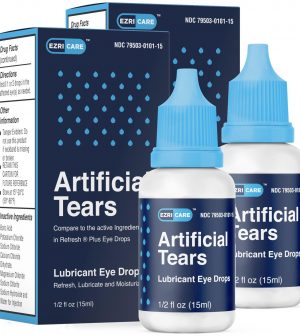- Could Your Grocery Store Meat Be Causing Recurring UTIs?
- Are You Making This Expensive Thermostat Error This Winter?
- Recognizing the Signs of Hypothyroidism
- 10 Strategies to Overcome Insomnia
- Could Artificial Sweeteners Be Aging the Brain Faster?
- Techniques for Soothing Your Nervous System
- Does the Water in Your House Smell Funny? Here’s Why
- Can a Daily Dose of Apple Cider Vinegar Actually Aid Weight Loss?
- 6 Health Beverages That Can Actually Spike Your Blood Sugar
- Treatment Options for Social Anxiety Disorder
FDA Finds Contamination Issues at Eye Drops Plant

(HealthDay News) – U.S. regulators inspecting a factory in India that has been linked to contaminated eyedrops have uncovered a laundry list of problems.
An outbreak of eye infections involving products made at the factory stems from exposure to a highly drug-resistant bacteria known as Pseudomonas aeruginosa. So far, three people have died, while there have been eight reports of lost vision and dozens of infections.
U.S. Food and Drug Administration inspectors were at Global Pharma Healthcare Ltd.’s factory from Feb. 20 through March 2, where they identified dirty equipment and clothing, as well as a lack of other safeguards.
The FDA issued citations to the company after what appears to be their first-ever visit to the plant.
“You used a manufacturing process that lacked assurance of product sterility,” the FDA said in the citation document.
Artificial tears drops and ointment involved include those branded as EzriCare and Delsam Pharma. Those products have already been recalled.
Among the many problems identified by the FDA were that surfaces touched by product packaging “were not cleaned, sanitized, decontaminated or sterilized.”
A machine used to fill product into bottles had a “black, brown greasy deposit” on one of its parts, though company logs said the machine had been cleaned weeks before and not used since.
Records about cleaning of filling machines and spaces also had gaps and discrepancies, CBS News reported.
Surfaces appeared to be hard to thoroughly clean. In one example, walls in a filling room had “soft, unsmooth and cracked sealant, protruding nails, and nail holes,” the report said.
Inspectors found booties used in the company’s clean rooms that were “discolored, and worn-out” and the company “did not track or have studies to show how many times” clothing could be reused by workers.
The company was also apparently not doing some important testing to ensure that the products were sterile or other tests to determine that the ingredients supplied to the company were in fact what they were supposed to be.
“Your firm failed to conduct at least one test to verify the identity of each component of a drug product. Your firm also failed to validate and establish the reliability of your component supplier’s test analyses at appropriate intervals,” the inspectors wrote.
Some testing of the unopened artificial tears early in the outbreak did not find bacteria, but it was found in already-opened bottles. However, the FDA later “found unopened tubes to be contaminated with bacteria,” CBS News reported.
The FDA did not say whether the strain of bacteria it found is the same as that seen in the outbreak.
More information
The U.S. Centers for Disease Control and Prevention has more on Pseudomonas aeruginosa.
SOURCE: CBS News
Source: HealthDay
Copyright © 2026 HealthDay. All rights reserved.










